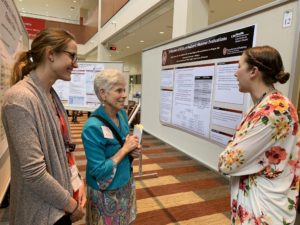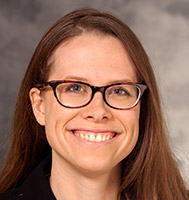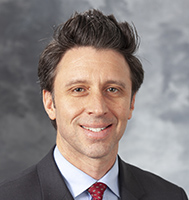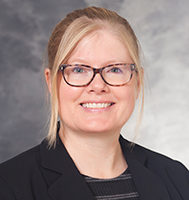 Scholarly work in GPAM focuses on work to advance child health. This work includes traditional research, with specific areas of focus around health services, digital health as well as medical education. Our scholarly work also includes a focus on QI, leveraging the opportunity that our Electronic Health Record and patient registries offers for this work. We have a strong teaching focus in our division, with several faculty doing medical education research as well as providing innovative teaching opportunities in advocacy and global health.
Scholarly work in GPAM focuses on work to advance child health. This work includes traditional research, with specific areas of focus around health services, digital health as well as medical education. Our scholarly work also includes a focus on QI, leveraging the opportunity that our Electronic Health Record and patient registries offers for this work. We have a strong teaching focus in our division, with several faculty doing medical education research as well as providing innovative teaching opportunities in advocacy and global health.
Research
 Jess Babal, MD
Jess Babal, MD
Jess Babal, MD is a general pediatrician at the 20 South Park Clinic in Madison, Wisconsin. Her academic work examines the culture of medicine and influencers of professional well-being. She aims to advance the medical humanities in the educational and professional setting (e.g. narrative medicine, reflective and creative writing, the creative arts, history and philosophy) as a way to foster thriving and advance patient care. She teaches the 2-week medical student elective: Introduction to the Medical Humanities.
Her publications have evaluated storytelling and limerick writing in resident education; factors that contribute to pediatrician wellness; factors that contribute to student pharmacist wellness; and gender bias in teaching evaluations. Along with her colleagues, she edited a textbook, “Understanding and Cultivating Well-being for Pediatricians.” The mission of the Babal research and scholarly team is to advance knowledge about pediatric resident and pediatrician well-being, the medical humanities, and storytelling in medicine.

Elizabeth Cox, MD, PhD
Launched in 2007, the Program of Research on Outcomes for Kids (PROKids) is a health services research team whose major goal is to improve the children’s outcomes by implementing family-centered interventions and evaluating these interventions from the perspectives of children and families. Under the leadership of Dr. Elizabeth Cox, PROKids not only conducts original research, but also serves as a key collaborator or consultant for other investigators at UW and beyond.
Jill Denson, PhD, MSW, APSW
Dr. Jill Denson is the Director of the CDC-funded UW Prevention Research Center, which is focused on improving the health of low-income women, infants, and families by conducting health promotion and disease prevention research focused on maternal, infant, and child health.

Anthony “Tony” Garcia-Prats, MD, MSc, PhD
The mission of the Garcia-Prats Research Group is to perform high quality clinical and translational research that positively impacts the care of vulnerable children with tuberculosis (TB), HIV and other illnesses in underserved areas globally, with a commitment to excellence, innovation, pragmatism, and partnership, and in a spirit of service and humility.

Mala Mathur, MD, MPH
The mission of the Families and Mindfulness Research Team is to improve the lives of children and families by promoting evidence-based principles of mindfulness including the use of these principles for the management of pediatric specific conditions. Dr. Mathur’s research interests focus on child and parent resilience using integrative health approaches including mindfulness practices to reduce stress and improve health outcomes.
Megan Moreno, MD, MSEd, MPH
The mission of the Social Media & Adolescent Health Research Team is to advance society’s understanding of the relationships between media and adolescent health towards educating adolescents, providing better care, and developing innovations in adolescent healthcare.

Ellen Selkie, MD, MPH
The Selkie research group seeks to identify ways to promote well-being for adolescents and young adults when using technology and digital media. Adolescence is a crucial developmental period in which skills and beliefs are developed and carried into adulthood. With the ubiquity of the Internet and social media, adolescents have many opportunities to use these technologies for positive development, but also can be at risk for harm. In 2015, Dr. Selkie, an Adolescent Medicine specialist, started the Learning More from Adolescents Online (LMFAO) Research Team at the University of Michigan and has recently moved the lab to the University of Wisconsin-Madison. Our work uses a positive youth development lens to examine how technology and digital media relate to socioemotional well-being. We are specifically interested in decreasing negative social media activities and amplifying positive social media activities for marginalized adolescents, including sexual and gender minority (SGM) youth. Youth voice and direct observation of social media activities are at the core of our team’s research methods.

